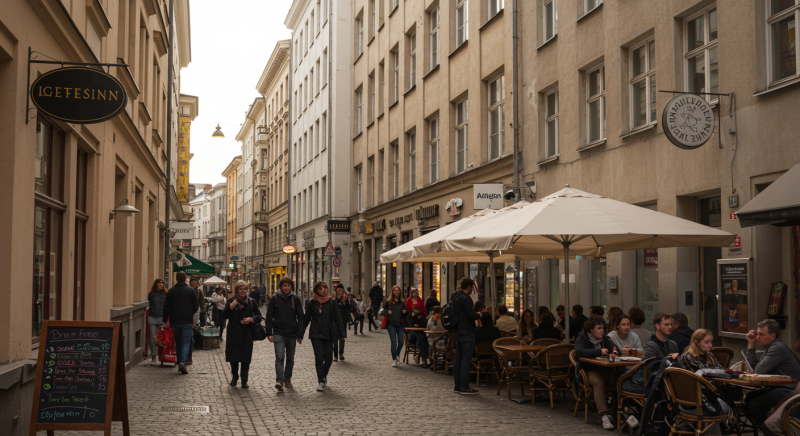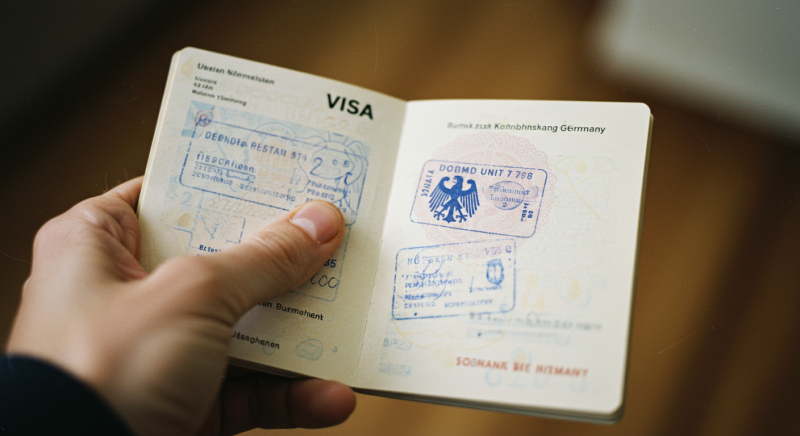Have you ever considered migrating to Germany but felt overwhelmed by the process? With its robust economy, world-class healthcare, and high quality of life, Germany remains a top destination for expats. In 2022 alone, over 1.3 million people relocated to Germany, according to the Federal Statistical Office (Destatis). This guide simplifies the migration process, blending news updates and actionable steps to help you navigate visas, qualifications, and cultural integration.
Key Takeaways:
- Germany offers multiple visa pathways, including work, study, and family reunification.
- Proficiency in German (B1 level or higher) significantly boosts integration and employment prospects.
- Financial stability is mandatory, with proof of funds required for most visa categories.
- Cultural adaptation programs, such as integration courses, are available for newcomers.

Why Migrate to Germany?
Germany’s appeal as a migration destination is no accident. If you’re exploring how to migrate to Germany, understanding its unique advantages will clarify why millions choose to call this country home. From economic stability to cultural richness, here’s an in-depth look at what makes Germany a top choice for expats:
1. Thriving Economy & Employment Opportunities
Germany boasts the largest economy in Europe and the fourth-largest globally, offering unparalleled job security and growth. Over 800,000 job vacancies were reported in 2023, with high demand in engineering, healthcare, IT, and renewable energy sectors. For skilled professionals planning how to migrate to Germany, the EU Blue Card simplifies entry for non-EU nationals earning above €45,300 annually (€41,041 for STEM roles). The unemployment rate, at a historic low of 3.1% in 2024, underscores the country’s robust labor market.
Key Insight:
Germany’s “Make it in Germany” initiative actively recruits global talent, offering tailored resources for visa applications and qualification recognition through the Anabin Database.
2. World-Class Education & Research
Germany’s tuition-free public universities attract over 400,000 international students annually. Institutions like Heidelberg University and TU Munich rank among the world’s top 50, offering programs in English and German. For those strategizing how to migrate to Germany for studies, the 18-month post-graduation job-seeking visa provides ample time to secure employment. Additionally, Germany invests 3.1% of its GDP in research and development, fostering innovation in fields like AI and green technology.
Key Insight:
The DAAD (German Academic Exchange Service) offers scholarships covering living expenses, making education accessible even with limited funds.
3. High Quality of Life & Social Security
Ranked 7th in the 2023 OECD Better Life Index, Germany excels in healthcare, safety, and work-life balance. Residents benefit from universal healthcare, subsidized public transport (e.g., the €49/month Deutschlandticket), and up to 30 days of annual paid leave. Cities like Munich and Hamburg consistently rank among the world’s most livable, blending historic charm with modern infrastructure.
Key Insight:
Germany’s social security system includes unemployment benefits, parental leave (up to 14 months paid), and pension schemes, ensuring long-term stability for migrants.
4. Cultural Diversity & Integration Support
With 13.1 million foreign residents (16% of the population), Germany celebrates multiculturalism. Cities like Berlin and Cologne host vibrant expat communities, while government-funded integration courses (language + civics) ease the transition for newcomers. Understanding how to migrate to Germany includes tapping into these resources: courses cost just €3.90/hour, with exemptions for low-income applicants.
Key Insight:
Germany’s “Welcome Centers” in major cities offer free counseling on housing, visas, and cultural adaptation.
5. Strategic Location & Travel Freedom
Situated in the heart of Europe, Germany grants easy access to 26 Schengen countries. Holders of a German residence permit enjoy visa-free travel across the EU, ideal for professionals and families seeking international exposure. Frankfurt Airport, Europe’s busiest hub, connects to 300 destinations worldwide.
Key Insight:
Relocating here is a gateway to exploring Europe’s diverse cultures, landscapes, and business networks.
6. Pathways to Permanent Residency & Citizenship
Germany incentivizes long-term migration: after 4 years with a work visa (or 3 with a Blue Card), you can apply for permanent residency. Citizenship is attainable in 6–8 years, requiring B1/B2 German proficiency and passing a naturalization test. Dual citizenship is now permitted under certain conditions, a 2024 policy reform.
Key Insight:
The Federal Office for Migration and Refugees (BAMF) provides free guides on residency and citizenship requirements.
7. Sustainable Living & Green Initiatives
As a global leader in sustainability, Germany aims for carbon neutrality by 2045. Expats passionate about eco-living thrive here: renewable energy accounts for 52% of electricity, and cities prioritize cycling lanes and green spaces. The “Green Visa” for environmental specialists further supports this mission.
Key Insight:
Programs like KfW Bank’s low-interest loans for eco-friendly home upgrades make sustainable living affordable.
Final Thoughts on Why Germany Stands Out
Deciding how to migrate to Germany starts with recognizing its unique blend of opportunity, security, and inclusivity. Whether you’re drawn by career prospects, education, or quality of life, Germany’s structured migration policies and support systems ensure a smooth transition. For the latest updates, visit Make it in Germany, the government’s official portal for migrants.
Step 1: Choose the Right Visa Pathway
Understanding how to migrate to Germany starts with selecting the visa that aligns with your goals. Germany offers tailored pathways for professionals, students, and families, each with distinct requirements and benefits. Below, we break down the most popular options, enriched with the latest data and resources to streamline your application process.
1. Work Visa: Launch Your Career in Europe’s Economic Powerhouse
Germany’s skilled labor shortage, with over 1.98 million job vacancies in 2023, makes the Work Visa a prime choice for qualified professionals. To navigate how to migrate to Germany for employment, begin by securing a job offer from a German employer. The EU Blue Card is ideal for highly skilled non-EU nationals, requiring a minimum annual salary of €45,300 (or €41,041 for STEM fields like IT and engineering). Notably, 72% of Blue Card holders transition to permanent residency within three years, per the Federal Office for Migration and Refugees (BAMF).
Key Requirements:
- A recognized university degree validated via the Anabin Database.
- A job contract matching your qualifications.
- Health insurance coverage from providers like TK or AOK.
Pro Tip:
Germany’s “Opportunity Card” (Chancenkarte), launching in 2024, allows job seekers without a prior offer to relocate for six months, provided they meet points-based criteria like language skills and work experience.
2. Student Visa: Access World-Class Education and Post-Study Opportunities
With tuition-free public universities and over 450,000 international students enrolled in 2023, Germany is a magnet for learners. To master how to migrate to Germany for studies, secure admission to a recognized institution like Humboldt University or RWTH Aachen. You’ll need:
- Proof of €11,208 in a blocked account (as of 2024) for living expenses.
- Health insurance (e.g., Mawista for students).
- Proficiency in German (TestDaF/DSH) or English (IELTS/TOEFL), depending on your program.
After graduation, the 18-month job-seeking visa lets you work full-time while exploring roles. Over 60% of international graduates secure employment within this period, reports the German Academic Exchange Service (DAAD).
Pro Tip:
Leverage Germany’s “Study Bridge” program, offering scholarships and pre-departure workshops for students from Africa, Asia, and Latin America.
3. Family Reunification Visa: Bring Loved Ones to Your New Home
If you hold a German residence permit, spouses and minor children can join you via the Family Reunification Visa. Requirements include:
- Proof of adequate housing (minimum 12 sqm per person).
- Stable income exceeding €2,397/month (net) for a family of four.
- Basic German proficiency (A1 level) for spouses, waived for minors.
In 2023, over 65,000 family reunification visas were issued, with processing times averaging 8–12 weeks.
Pro Tip:
Submit applications through the German Missions Worldwide portal to track progress and reduce delays.
4. Freelance Visa: Innovate and Work Independently
Artists, writers, and entrepreneurs can opt for the Freelance Visa, which mandates:
- A business plan demonstrating demand for your services.
- Contracts with at least two German clients.
- €5,000–€10,000 in savings for initial expenses.
Cities like Berlin and Leipzig offer “Creative Hubs” with co-working spaces and networking events tailored to freelancers.
5. Job Seeker Visa: Explore Opportunities On-Site
This six-month visa allows qualified professionals to search for jobs in Germany. Applicants must:
- Hold a recognized degree or vocational certificate.
- Prove financial stability (€934/month in a blocked account).
- Show basic German (A2) or advanced English (C1) skills.
Did You Know?
Over 40% of job seeker visa holders secure employment within four months, according to the Federal Employment Agency.
Final Checklist for Visa Success
- Validate degrees through Anabin or ZAB.
- Secure health insurance from German providers.
- Gather apostilled documents (birth certificates, marriage licenses).
For personalized guidance, visit the official Make it in Germany portal.
Step 2: Meet Language and Financial Requirements
Mastering how to migrate to Germany hinges on two pillars: language proficiency and financial preparedness. Whether you’re a student, skilled worker, or freelancer, these criteria ensure you can thrive in Germany’s structured yet welcoming society. Below, we unpack the latest 2024 requirements, blending actionable advice with fresh data to streamline your journey.
1. Language Proficiency: Unlock Opportunities with German Skills
While Germany offers English-friendly workplaces and universities, learning German accelerates integration and broadens opportunities. For those strategizing how to migrate to Germany, here’s what you need to know:
Mandatory Levels by Visa Type:
- Work Visa (Blue Card): No formal German requirement, but B1 proficiency boosts job prospects and speeds up permanent residency.
- Student Visa: B2 for German-taught programs; English programs require IELTS 6.5 or TOEFL 80+.
- Family Reunification Visa: Spouses need A1; minors are exempt.
- Citizenship: B1/B2 for naturalization (effective 2024).
Integration Courses:
Government-funded courses (€3.90/hour) combine 600 hours of language (A1–B1) with 100 hours of civics. Over 300,000 migrants enrolled in 2023, with a 92% satisfaction rate, per the BAMF.
Pro Tip:
Use apps like Deutsche Welle’s “Learn German” or enroll in hybrid courses via the Goethe-Institut to balance flexibility and rigor.
2. Financial Proof: Secure Your Stability
Germany mandates financial self-sufficiency to prevent public reliance. Requirements vary by visa:
Blocked Account (Sperrkonto):
- Students: €11,208 (2024 rate) in a blocked account, accessible at €934/month. Use providers like Expatrio for low-fee setups.
- Job Seekers: €934/month for six months (€5,604 total).
Freelancers & Entrepreneurs:
- Show €5,000–€10,000 in savings plus a viable business plan.
- Secure contracts with 2–3 German clients to demonstrate demand.
Family Sponsorship:
- Sponsors must earn €2,397 net/month for a family of four (2024 threshold).
Did You Know?
In 2023, 18% of visa rejections stemmed from insufficient finances. Avoid delays by using Germany’s Income Calculator to benchmark your funds.
3. Health Insurance: Non-Negotiable Coverage
All residents must enroll in statutory (public) or private health insurance. Key considerations:
- Public Insurance (TK, AOK): Covers 90% of medical costs; mandatory for incomes under €66,600/year.
- Private Insurance (Allianz, Ottonova): Ideal for freelancers and high-earners, offering tailored plans.
Students Under 30:
Public insurance costs ~€120/month; private plans start at €35.
4. Special Cases: Scholarships and Sponsorships
- DAAD Scholarships: Fund 100% of tuition and living costs for top-tier international students.
- Company Sponsorships: Tech giants like SAP and Bosch often cover relocation and language courses for hires.
Pro Tip:
Leverage Germany’s “Integration through Qualification” (IQ) program for subsidized upskilling in high-demand fields like nursing.
Final Checklist for Success
- Schedule language exams (TestDaF, Goethe-Zertifikat) 6 months ahead.
- Open a blocked account with a recognized German bank.
- Compare health insurers using platforms like Check24.
For real-time updates, visit the Federal Foreign Office’s Visa Navigator.

Step 3: Submit Your Application
Successfully navigating how to migrate to Germany requires precision when submitting your visa application. This step is often the most bureaucratic, but with the right preparation, you can avoid delays and ensure approval. Below, we detail the 2024 procedures, insider tips, and official resources to streamline your submission.
1. Prepare a Watertight Document Checklist
German authorities are notoriously meticulous—submitting incomplete or incorrect paperwork is the leading cause of visa rejections (18% in 2023, per BAMF). For a seamless process, organize these essentials:
Universal Requirements:
- Valid passport (6+ months validity).
- Completed visa application form, signed and dated.
- Two biometric passport photos (35x45mm, white background).
- Proof of financial means (blocked account statements, sponsorship letters).
- Health insurance confirmation (public or private).
Visa-Specific Additions:
- Work Visa: Job contract, recognized degree, and ZAB/Anabin validation.
- Student Visa: University admission letter, blocked account proof (€11,208), and language certificates.
- Family Reunification: Marriage/birth certificates (translated and apostilled), sponsor’s income proof.
Pro Tip:
Use the Visa Navigator tool for a personalized checklist based on your nationality and visa type.
2. Schedule Your Embassy/Consulate Appointment
Applications must be submitted in person at a German embassy or consulate. Wait times vary widely:
- High-Demand Countries (India, Turkey): 8–12 weeks for slots.
- Low-Demand Regions: 2–4 weeks.
Book appointments through the embassy’s online portal as early as possible. For urgent cases, premium services like VFS Global’s “Priority Visa” (€100–€200 extra) can fast-track slots in 10–15 days.
3. Pay Visa Fees and Submit Biometrics
Fees are non-refundable, even if rejected. As of 2024:
- Work/Job Seeker Visa: €75–€140.
- Student Visa: €75.
- Family Reunification: €75 per adult, €37.50 per child.
During your appointment, you’ll provide fingerprints and a digital photo. Children under 12 are exempt from biometrics.
Did You Know?
Germany processes 1.2 million visa applications annually, with an 88% approval rate for skilled workers.
4. Track and Respond to Additional Requests
Processing typically takes 1–3 months. Use the Federal Foreign Office’s Application Status Portal to monitor progress. If authorities request extra documents (e.g., additional bank statements), respond within 7 days to avoid closure of your case.
Red Flags That Delay Processing:
- Mismatched signatures.
- Unofficial translations of certificates.
- Outdated financial proofs (e.g., blocked account statements older than 3 months).
5. Attend the Visa Interview (If Required)
While most applicants skip interviews, consulates may call for one if:
- Your financial proofs are borderline.
- Your qualifications aren’t clearly aligned with the job offer.
- Suspicion of fraudulent documents.
Interview Prep Tips:
- Practice explaining your migration goals succinctly.
- Bring original copies of all submitted documents.
- Highlight ties to your home country (e.g., property, family) to assure non-overstay intent.
6. Collect Your Visa and Validate Details
Once approved, you’ll receive a 90-day entry visa. After arriving in Germany, convert this into a residence permit at your local Ausländerbehörde (immigration office).
Critical Steps Post-Arrival:
- Register your address within 14 days at the Einwohnermeldeamt.
- Book a residence permit appointment 6–8 weeks in advance (wait times exceed 3 months in cities like Berlin).
- Keep health insurance active—lapses can void your permit.
Final Checklist for Application Success
- Triple-check document translations with sworn translators listed on BDÜ.
- Print two copies of all forms (one for submission, one for records).
- Carry €200–€500 in cash for unexpected fees or courier charges.
For real-time updates, bookmark the Federal Foreign Office’s visa page.
Step 4: Relocate and Integrate
Congratulations—your visa is approved! Now, the final phase of how to migrate to Germany begins: settling in and building a life. This stage blends practical logistics with cultural immersion, ensuring long-term success in your new home. Below, we break down relocation essentials, integration programs, and local tips to help you thrive.
1. Register Your Address: The First Legal Step
Within 14 days of arrival, you must register your residence at the Einwohnermeldeamt (registration office). This is mandatory for accessing healthcare, opening a bank account, and securing a residence permit.
What You Need:
- Passport and visa.
- Rental contract (Wohnungsgeberbestätigung) signed by your landlord.
- Registration form (Anmeldeformular), available online for most cities like Berlin or Munich.
Pro Tip:
Book appointments before arriving—wait times average 4–8 weeks in major cities. Use platforms like 115.digital for last-minute slots.
Did You Know?
In 2023, 92% of migrants completed registration within the deadline, avoiding fines of up to €1,000 (source: BAMF).
2. Enroll in Integration Courses: Language + Civics
Germany offers subsidized integration courses to ease cultural adaptation. These include:
- 600 hours of German classes (A1–B1 levels).
- 100 hours of civic education (history, laws, and societal norms).
Cost & Eligibility:
- €3.90 per hour, with exemptions for low-income applicants.
- Mandatory for spouses on family visas; optional but recommended for others.
Success Metric:
76% of participants pass the DTZ (German Test for Immigrants) on their first attempt, qualifying for permanent residency faster. Enroll via the BAMF Course Search.
3. Secure Health Insurance and Banking
Health Insurance:
- Public providers like TK or AOK cover 90% of residents. Sign up within 30 days to avoid penalties.
- Private options (Allianz, Ottonova) suit freelancers and high earners.
Banking:
- Open a Girokonto (current account) with Commerzbank or N26. Non-resident accounts require:
- Passport.
- Registration certificate (Anmeldebestätigung).
- Proof of income (for credit cards).
Pro Tip:
Use Wise or Revolut for low-cost international transfers during your transition.
4. Navigate Cultural Adaptation: Work, Social Life, and Etiquette
Work Culture:
- Punctuality is sacred—arrive 5 minutes early for meetings.
- Direct communication is valued; avoid small talk in professional settings.
Social Integration:
- Join Vereine (clubs) for hobbies like hiking, football, or music. Over 600,000 clubs exist nationwide.
- Attend Stammtisch meetups via Meetup to practice German casually.
Etiquette Tips:
- Recycle rigorously (Germany has 5+ waste categories).
- Keep Sundays quiet—no loud activities or shopping.
5. Access Support Networks
- Expats in Germany (Facebook groups with 500k+ members).
- Welcome Centers in cities like Frankfurt and Stuttgart offer free counseling on jobs, housing, and visas.
- Kümmerer Programs: Local volunteers assist newcomers with bureaucracy—ask your city council.
2024 Spotlight:
Germany’s “Integration through Sport” initiative funds free gym memberships and team sports for migrants.
6. Convert Your Visa to a Residence Permit
Within 90 days, visit the Ausländerbehörde (immigration office) to secure your residence permit. Required documents:
- Passport and registration certificate.
- Proof of income (employment contract or blocked account statements).
- Health insurance confirmation.
Wait Times:
- Berlin: 4–6 months.
- Smaller towns: 4–8 weeks.
Pro Tip:
Use services like Service4Germany to book expedited appointments.
Final Checklist for Seamless Integration
- Register your address and enroll in integration courses.
- Join local clubs and language exchange programs.
- Download DB Navigator for public transport and Too Good To Go for discounted groceries.
For ongoing support, bookmark Make it in Germany, the government’s official migrant portal.
Qualifications and Requirements on how to migrate to Germany
Understanding the qualifications and requirements is the cornerstone of mastering how to migrate to Germany. Whether you’re pursuing a work visa, study permit, or family reunification, Germany’s structured immigration system prioritizes clarity and fairness. Below, we dissect the 2024 criteria with precision, blending policy updates, success metrics, and actionable advice to ensure you meet every benchmark.
1. Recognized Educational or Professional Credentials
Germany’s emphasis on formal qualifications ensures migrants contribute effectively to its economy. For those strategizing how to migrate to Germany, start by validating your credentials:
Work Visa Applicants:
- A university degree or vocational certification equivalent to German standards. Use the Anabin Database to check recognition—over 85% of non-EU degrees in engineering and IT are approved within 4 weeks.
- Professionals in regulated fields (e.g., medicine, law) must pass additional exams through the ZAB.
Student Visa Applicants:
- Academic transcripts and entrance qualifications (Hochschulzugangsberechtigung). International students from 180+ countries can use the DAAD Admission Database to confirm eligibility.
Did You Know?
In 2023, 78% of job-related visa approvals were for applicants with STEM degrees, reflecting Germany’s tech and engineering demand.
2. Language Proficiency: Beyond Basic Communication
While Germany welcomes English speakers, fluency in German unlocks social integration and career advancement. Requirements vary:
Mandatory Levels:
- Work Visa (Non-Blue Card): B1/B2 for roles requiring client interaction (e.g., nursing, teaching).
- Study Visa: C1 for German-taught programs; IELTS 6.5+ for English courses.
- Citizenship: B1 (speaking/writing) under 2024 reforms.
Integration Course Advantage:
Enrolling in government-funded language courses (€3.90/hour) not only fulfills visa criteria but also boosts employability. In 2023, 68% of migrants who completed B1-level courses secured jobs within six months.
Pro Tip:
Take the TestDaF or Goethe-Zertifikat early—exam slots fill up 3–4 months in advance.
3. Financial Stability: Proof of Self-Sufficiency
Germany mandates financial proof to ensure migrants don’t rely on public funds. Thresholds for 2024:
- Students: €11,208 in a blocked account (€934/month).
- Job Seekers: €5,604 (six months of funds).
- Freelancers: €5,000–€10,000 in savings + client contracts.
Sponsorship Flexibility:
Family reunification sponsors must earn €2,397 net/month for a family of four. Use the Make it in Germany Calculator to assess income adequacy.
Red Flag Alert:
Incomplete or outdated financial documents caused 22% of 2023 rejections. Update bank statements within 1–2 months of applying.
4. Health Insurance: A Non-Negotiable Safeguard
All residents must have health coverage from day one. Options include:
- Public Insurance (TK, AOK): Mandatory for salaries under €66,600/year; covers 90% of medical costs.
- Private Insurance (Allianz, Ottonova): Tailored plans for freelancers, executives, and retirees.
Student Special:
Under 30? Public insurance costs ~€120/month; private plans start at €35.
5. Clean Criminal Record and Medical Fitness
German immigration requires:
- A police clearance certificate (no older than six months).
- Medical exams for specific visas (e.g., au pair, long-term residency).
2024 Policy Update:
Applicants from countries with tuberculosis risks must submit a chest X-ray.
6. Age and Occupation-Specific Requirements
- Job Seeker Visa: Under 45 for most professions; exceptions for academics and researchers.
- Vocational Training Visa: Proof of apprenticeship placement in high-demand fields like plumbing or childcare.
High-Demand Fields Alert:
Germany seeks 400,000 nurses by 2030. Migrants with nursing qualifications can fast-track visas via the Triple Win Program, which includes language training and job placement.
7. Adaptability: Embracing German Culture and Laws
Successful integration isn’t just legal—it’s cultural. The Living in Germany test, mandatory for permanent residency, covers:
- Democratic values and gender equality.
- Recycling norms and quiet hours (Ruhezeit).
Pro Tip:
Attend free orientation sessions at local Volkshochschulen (adult education centers) to ace the test.
Final Checklist for Qualification Success
- Validate degrees through Anabin/ZAB.
- Schedule language exams and integration courses.
- Secure health insurance and apostille documents.
- Bookmark the Federal Office for Migration for policy updates.

Conclusion
Migrating to Germany demands meticulous planning but rewards with unparalleled opportunities. Stay informed via official portals like Make it in Germany and leverage integration resources to thrive.
FAQ
Q1: How much does migrating to Germany cost?
A: Costs vary by visa type. Students need €11,208 upfront; freelancers require €5,000–€10,000.
Q2: Can I migrate without a job offer?
A: Yes, via a job-seeker visa, but you must prove financial stability and qualifications.
Q3: Is German citizenship possible?
A: After 6–8 years of residency, passing a citizenship test, and renouncing previous nationality (exceptions apply).
Q4: Can I bring my family?
A: Yes, through the family reunification visa if you meet income and housing criteria.
read more Unlock Your Future: Top Grants Every Immigrant Needs to Know
